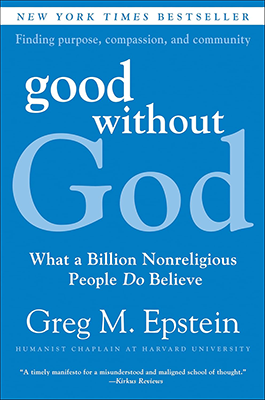Good Without God
“Good Without God: What a Billion Nonreligious People Do Believe” is a book written by Greg Epstein, published in 2009. Greg Epstein is a humanist chaplain at Harvard University and a prominent figure in the secular humanist movement. In “Good Without God,” Epstein explores the ethical and philosophical foundations of secular humanism and discusses what it means to live a meaningful and moral life without belief in a deity. Here’s a summary of the key themes and ideas presented in the book:
Secular Humanism: Epstein defines secular humanism as a worldview that emphasizes human values, ethics, and the importance of reason and compassion in guiding one’s actions and decisions. He contrasts this with religious ethics and argues for the relevance and validity of a nonreligious ethical framework.
Ethics and Morality: The book explores how individuals who do not subscribe to religious beliefs derive their moral principles and ethical values. Epstein discusses various philosophical approaches to ethics, including utilitarianism, Kantian ethics, and virtue ethics, and how they can inform ethical decision-making in everyday life.
Community and Meaning: Epstein emphasizes the importance of community and belonging for nonreligious individuals. He discusses how secular communities can provide support, fellowship, and opportunities for ethical engagement and social activism.
Cultural Critique: Epstein critiques religious doctrines and practices that he views as harmful or outdated, while also acknowledging the positive aspects of religion such as community building and charitable work. He advocates for a secular alternative that promotes human flourishing and social justice.
Humanist Values: The book outlines humanist values such as empathy, compassion, justice, and the pursuit of knowledge and understanding. Epstein argues that these values are universal and can serve as a basis for ethical behavior and societal progress.
Philosophical Reflections: Throughout the book, Epstein engages with philosophical questions about meaning, purpose, and the nature of existence. He explores how individuals can find fulfillment and create meaning in their lives through relationships, personal growth, and contributing to the well-being of others.
Interfaith Dialogue: Epstein encourages dialogue and cooperation between religious and nonreligious communities. He promotes mutual respect and understanding while advocating for the separation of church and state and the rights of nonbelievers.
Overall, “Good Without God” is a manifesto for secular humanism, offering a positive and affirming perspective on ethics, community, and the human experience without recourse to religious beliefs. It appeals to readers interested in philosophy, ethics, and the role of religion in contemporary society, providing a thoughtful exploration of alternative perspectives on morality and meaning.

